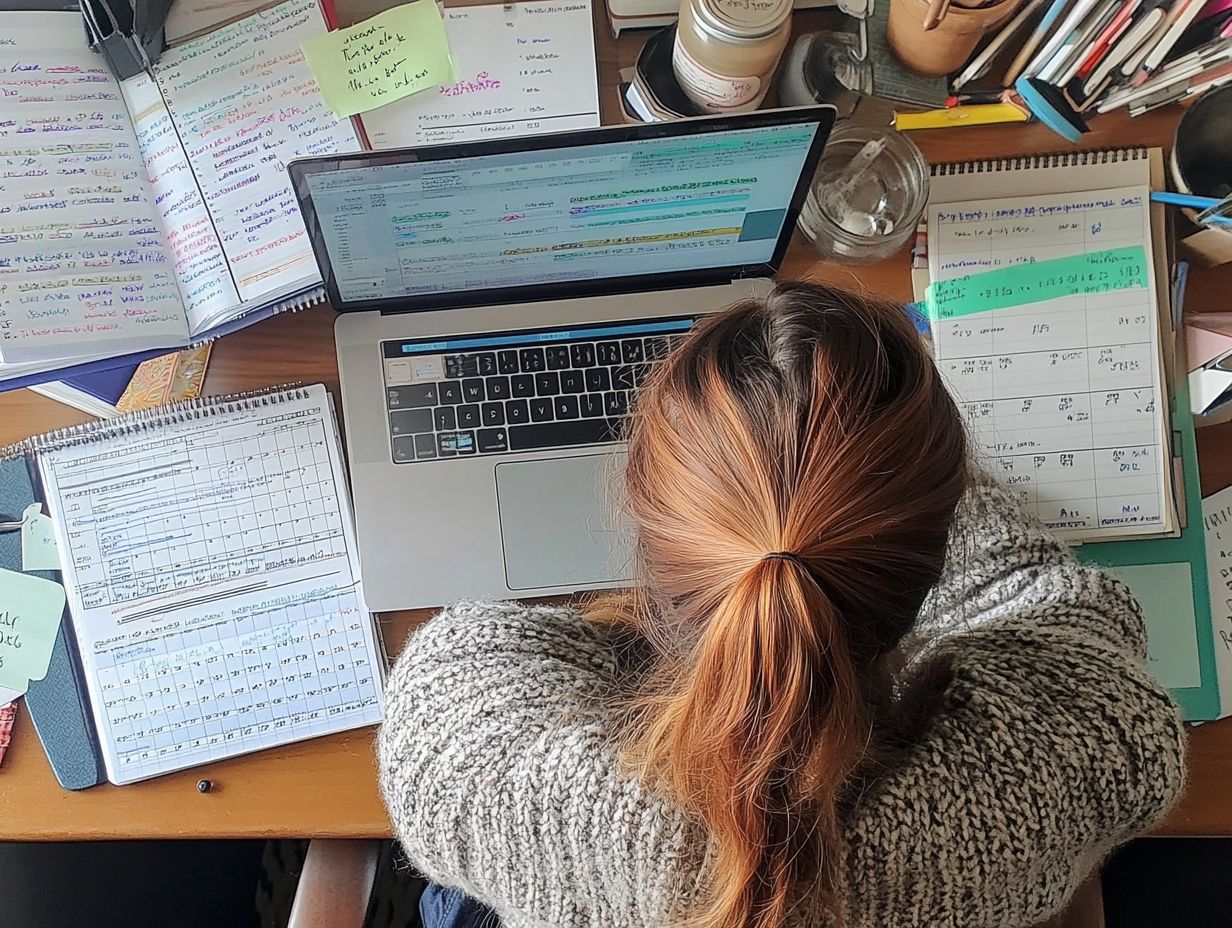5 study techniques for retaking exams
Retaking exams can be daunting, but with the right strategies, you can turn this challenge into an amazing opportunity for success!
This article delves into five effective study techniques that will elevate your preparation:
- Crafting a detailed study plan
- Identifying your weak areas
- Using memory aids (tools that help you remember information) like flashcards
- Practicing with past exam questions
- Seeking guidance from teachers or tutors
It also tackles common hurdles such as motivation, test anxiety, and methods to track your progress. This ensures you re fully equipped for a fresh start.
Whether you’re aiming to boost your scores or build your confidence, these insightful tips will guide you on the path to achievement.
Contents
- Key Takeaways:
- 1. Create a Study Plan
- 2. Identify Weak Areas and Focus on Them
- 3. Use Flashcards or Other Memory Aids
- 4. Practice Past Exam Questions
- 5. Seek Help from Teachers or Tutors
- How Can One Stay Motivated When Retaking Exams?
- Frequently Asked Questions
- What are 5 study techniques for retaking exams?
- How can practicing with past exams help me retake an exam?
- Why is it important to review lecture notes when retaking an exam?
- How can creating flashcards improve my chances of success when retaking an exam?
- Why is studying in short, focused sessions better than cramming for a retake exam?
- How can seeking help from a tutor or study group benefit me when retaking an exam?
Key Takeaways:

- Create a study plan to manage your time and focus on weak areas.
- Identify your weak spots and use memory aids to improve retention.
- Practice past exam questions to get familiar with the format.
1. Create a Study Plan
A detailed study plan is key to effective studying. It helps you manage your time wisely, prioritize course material, and establish consistent study habits.
To begin crafting your personalized study plan, it’s crucial to identify how you learn best whether you lean toward visual, auditory, or kinesthetic approaches so you can tailor your methods accordingly.
Setting specific study goals can significantly enhance your focus. For instance, aiming to cover a particular chapter each week or mastering a set number of practice problems daily can provide you with a structured path forward.
Effective time management is crucial. Consider breaking down your study sessions into manageable blocks and utilizing tools like concept maps to help visualize complex information.
Maintaining a balanced schedule that includes regular breaks and leisure activities will ensure you stay motivated and support your mental well-being throughout your academic journey.
2. Identify Weak Areas and Focus on Them
Identifying weak areas in your understanding of the course material is essential for honing your study efforts. It gives you the power to leverage self-testing and effective study techniques to boost memory retention.
One particularly effective method to uncover these vulnerabilities is through self-assessment quizzes, offering you immediate insights into your comprehension levels. Seeking constructive feedback from professors or peers can also help identify blind spots.
To address these weak points, consider engaging more actively with the material. Forming study groups or teaching concepts to classmates can foster a deeper understanding that benefits you.
Implementing specific study techniques, such as reviewing material at spaced intervals or using visual aids, can further solidify your knowledge, transforming weaknesses into strengths and ultimately elevating your academic performance.
3. Use Flashcards or Other Memory Aids
Employing flashcards or other memory aids is an effective studying method that significantly enhances your information recall by actively engaging you during study sessions.
To make your flashcards even more impactful, incorporating visuals can greatly boost your memory retention. Using images that relate to the content helps create mental connections, while mnemonics act as clever memory triggers that link complex concepts to simpler phrases or ideas.
By combining flashcards with other study tools, like concept maps, you can develop a comprehensive learning strategy. Concept maps allow you to visualize relationships between concepts, providing an overarching framework that complements the discrete facts on your flashcards.
Integrating these techniques enables you to enhance your cognitive processes, leading to a deeper and more meaningful understanding of the material.
4. Practice Past Exam Questions

Practicing past exam questions is an important part of effective exam preparation. It helps you get familiar with the exam format and improves your ability to recall information by testing yourself.
Regularly answering these questions boosts your subject knowledge. It also sharpens your time management skills, teaching you how to allocate the right amount of time to each question during the exam.
This practice reduces test anxiety. You gain confidence from repeated exposure to similar types of questions.
Analyzing your answers helps you identify specific areas to improve in your study techniques. This way, you can change your approach and focus on your weak points.
Ultimately, this leads to a more effective preparation strategy.
5. Seek Help from Teachers or Tutors
Getting help from teachers or tutors is a crucial strategy for improving your study skills. It promotes active learning and offers personalized guidance tailored to your needs.
Engaging with educators provides insights that often elude traditional classroom settings. When you approach them, ask specific questions to target your challenges, such as:
- “What strategies can I use to better understand this topic?”
- “Can you recommend resources to help me grasp the material?”
Discussing time management and study techniques can lead to valuable conversations. This supportive environment helps motivate you and unlock your full potential.
How Can One Stay Motivated When Retaking Exams?
Staying motivated while retaking exams requires a strategic approach. Focus on effective study strategies, such as 5 study techniques to improve memory retention, set realistic goals, and nurture a positive mindset for academic success.
Establishing a consistent study routine enhances your ability to stay on track. Rewarding yourself for achieving small milestones makes studying more enjoyable.
Visualizing success is key; it keeps you focused on your goals. Remember, maintaining a healthy lifestyle with proper nutrition, sleep, and exercise is essential for sustaining motivation and energy.
What Are the Benefits of Retaking Exams?
Retaking exams offers many advantages. It enhances your learning outcomes and helps you refine your study techniques for college exams.
This approach boosts your confidence and improves long-term retention of information. By reflecting on past performances, you can identify misconceptions and areas needing improvement.
Revisiting course material promotes deeper engagement, fostering significant academic growth. These experiences can turn challenges into valuable lessons.
What Are the Common Mistakes to Avoid When Retaking Exams?

Common mistakes when retaking exams include neglecting material review and relying on ineffective study habits. To avoid this, consider implementing 5 study techniques for science students that can help enhance your ability to improve your scores.
Creating a structured study schedule helps overcome procrastination. It ensures every topic gets the attention it deserves.
Using active study techniques, like self-quizzing or teaching concepts, enhances retention and understanding. Addressing test anxiety is also crucial; incorporating 5 tips for staying focused during exams, such as mindfulness exercises or practice exams, can help you stay calm on test day.
How Can One Overcome Test Anxiety When Retaking Exams?
Overcoming test anxiety when retaking exams requires you to implement effective study techniques, engage in self-quizzing, and adopt a positive mindset to elevate your performance.
Creating a calm and supportive study environment can significantly lower your stress levels.
Integrating relaxation techniques, such as deep breathing exercises or mindfulness meditation, not only helps you manage anxiety but also enhances your focus during study sessions.
Visualization can be a powerful ally, allowing you to mentally rehearse your test-taking experience and reinforcing a sense of preparedness.
Surrounding yourself with encouraging peers or mentors makes the process feel less daunting, transforming anxiety into a challenge you can tackle.
Together, these approaches pave the way for greater confidence and improved results.
What Are the Different Study Techniques for Different Types of Exams?
Different types of exams call for tailored study techniques that align with the specific subject matter, whether it’s history, psychology, mathematics, or English. For effective preparation, consider implementing 5 tips to ace your next practice test, as this alignment is essential for optimizing your learning strategy and outcomes.
For instance, when you re tackling historical events, concept mapping a visual way to see connections between ideas can be a powerful tool. It helps you visualize connections and timelines, helping you understand better.
On the other hand, mathematics often requires a different approach; engaging with practice problems allows you to apply concepts in real-time, solidifying your grasp on formulas and theories.
In terms of English, effective reading comprehension strategies like summarization and questioning can significantly enhance your ability to analyze texts. By recognizing your individual learning style be it visual, auditory, or kinesthetic you can amplify the effectiveness of these tailored study methods, ensuring you discover your optimal path to academic success.
How Can One Measure Their Progress When Retaking Exams?
Tracking your progress is vital for success when retaking exams. You can utilize methods like self-testing, tracking your study habits, and analyzing improvements in information recall, along with 5 study techniques to tackle difficult subjects, to ensure you are truly preparing effectively.
Incorporating practice tests and quizzes into your regular study schedule offers valuable insights into areas that need more attention, while also helping to boost your confidence.
Evaluating your study techniques be it through flashcards, summarization, or engaging in group discussions allows you to discover which methods yield the best results.
It’s important to regularly reflect on your study habits, taking note of what strategies are effective and which ones might need a little tweaking. By adapting and refining your approach based on these evaluations, you can foster continuous improvement. Consider implementing 5 study techniques to enhance critical thinking, ultimately enhancing your readiness for the exam.
Frequently Asked Questions

What are 5 study techniques for retaking exams?
- Practice with past exams: Familiarize yourself with the exam format and types of questions.
- Review lecture notes: Focus on areas you struggled with previously.
- Create flashcards: Memorize key concepts and information.
- Study in short sessions: Break study time into focused periods to retain information better.
- Seek help: Find a tutor or join a study group for additional support.
How can practicing with past exams help me retake an exam?
Practicing with past exams can help you become familiar with the exam format and types of questions that may be asked. This can help reduce test anxiety and improve your overall performance.
Why is it important to review lecture notes when retaking an exam?
Reviewing your lecture notes can help you identify areas that you struggled with during the previous attempt. Additionally, incorporating the top 5 strategies for effective practice tests can reinforce important information and concepts that may appear on the exam.
Start using these techniques today to boost your confidence and ace that exam!
How can creating flashcards improve my chances of success when retaking an exam?
Creating flashcards helps you memorize essential information and concepts.
This technique is especially useful for subjects like vocabulary or formulas.
Why is studying in short, focused sessions better than cramming for a retake exam?
Studying in shorter sessions improves your ability to retain information.
Your brain processes and stores information better when it comes in smaller chunks over time.
How can seeking help from a tutor or study group benefit me when retaking an exam?
If you struggle with a subject, a tutor or study group can offer valuable support.
This assistance can enhance your understanding and boost your chances of success on the exam.





